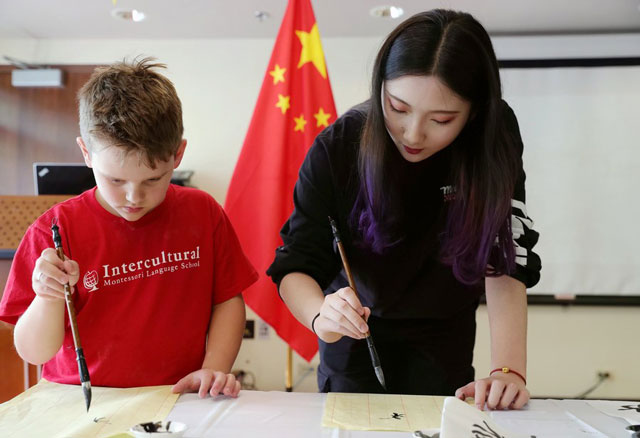
Strains with China are “the biggest problem for America, the biggest problem for the world,” said former U.S. Secretary of State Henry Kissinger during a forum on global issues on Friday. “Because if we can’t solve that, then the risk is that all over the world a kind of cold war will develop between China and the United States.”
COMMENT | Yang Shilong – Xinhua | The United States and China have to build “guardrails” around the consequential bilateral ties and maintain constant communication to avoid possible miscalculation and confrontation between the two major countries, U.S. experts and scholars have said.
During the McCain Institute’s Sedona Forum on global issues on Friday, former U.S. Secretary of State Henry Kissinger said strains with China are “the biggest problem for America, the biggest problem for the world.”
“Because if we can’t solve that, then the risk is that all over the world a kind of cold war will develop between China and the United States,” said the 97-year-old veteran diplomat, whose secret visit to China in 1971 paved the way for the rapprochement between the United States and China after decades of hostility.
The mix of economic, military and technological strengths of the two heavyweights carried more risks than the Cold War with the Soviet Union, he said, calling on Washington to take a two-pronged approach in its policy toward China — standing firm on U.S. principles to demand China’s respect, while maintaining a constant dialogue and finding areas of cooperation.
When addressing the China Development Forum 2021 via video in March, the acclaimed diplomat said it is of necessity that the United States and China sometimes have a different view of practice because of their different cultures and histories.
“But at the same time, the modern technology, the global communications and the global economy require that the two societies begin ever more intensive efforts to work together, because the peace and prosperity of the world depend on an understanding between the two societies,” Kissinger said.
Joseph Nye, a distinguished U.S. political scientist, said in his forthcoming column for Project Syndicate that “this great power competition can be dangerous if mishandled, but it can also be healthy if we play it right.”
“In the domain of ecological interdependence, power becomes a positive sum game. We cannot simply think in terms of American powers over others. We must also think of power with others,” said Nye, who has developed international relations theories including neoliberalism, soft power and smart power.
“On many transnational issues, empowering others helps us to accomplish our goals. The United States benefits if China improves its energy efficiency and emits less carbon dioxide. We have to cooperate at the same time we compete,” he added.
Nye suggested in an interview with Xinhua in March a “cooperative rivalry” between the two large countries, and that relationship requires careful management and constant communication, such as regular strategic dialogues, to avoid possible miscalculation.
In the China-U.S. Joint Statement addressing the Climate Crisis issued after talks between China Special Envoy for Climate Change Xie Zhenhua and U.S. Special Presidential Envoy for Climate John Kerry in Shanghai last month, the two countries agreed to each implement the phasedown of hydrofluorocarbon production and consumption reflected in the Kigali Amendment to the Montreal Protocol.
An article on the Natural Resources Defense Council said the movement provides a strong signal to the rest of the world that the two biggest economies will “help bring other countries along to deliver its environmental and economic benefits.”
As one hand cannot clap, the United States and China have to create “guardrails” within their relationship to ensure the ties stay on a predictable and stable track, Sourabh Gupta, a senior fellow at the Washington-based Institute for China-America Studies, told Xinhua recently.
As the two sides once again re-engage and search for areas of commonality, where they are and where they prosper mutually and beneficially, he hopes that these areas will far exceed the areas where they have differences.
The expert expressed the hope that the United States will “be able to gradually, very imperceptibly in a way to pivot away from the extreme hostility that had been engendered by the previous administration towards China.”
****
XINHUA
The post US, China need to build ‘guardrails’, keep constant dialogue to avoid confrontation – experts appeared first on The Independent Uganda:.
from WORLD – The Independent Uganda: https://ift.tt/3vzHoKs
0 Comments